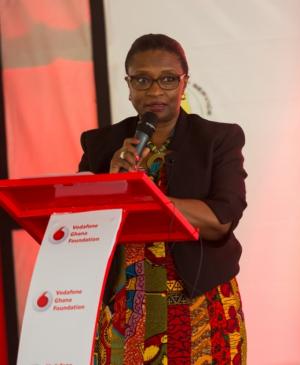WHO Statement on the occasion of launch of Vodafone HealthLine 255 Call Centre New Capability Health Worker to Health Worker to Health Worker Call Service on Ebola
Accra, 24 April 2015 - Good Day
- CEO, Mr Haris Broumidis - Vodafone
- Dr Sylvester Anemana - Chief Director Ministry of Health
- Dr Byrite Asamoah - Vantage Medical Solutions
- Dr Samuel Kaba - Ghana Health Services (GHS) representing the DG
- The health workers and call centre operators in whose honour we meet today and friends of the media, distinguished guests,
- Ladies and Gentleman,
There is an old African proverb that I especially find relevant for today.
It states: “If you want to go fast, go alone. If you want to far, go together”
Today, Ghana Health Services, Vodafone Foundation, Vantage Medical Solutions (VMS) and the World Health Organization has gathered here, to launch the Healthline255 new capabilities as my esteemed colleagues mentioned, in a clear demonstration that going together, we go far!
Today, I want to speak to you about the importance and power of partnerships which the Ebola outbreak has clearly demonstrated, if there were still any doubts. The Ebola outbreak which has persisted for more than a year, has infected over 25,000 people and resulted in more than 10,000 deaths in nine countries, according to WHO’s latest estimates of 15 April 2015. The history of public health in Guinea, Liberia and Sierra Leone, West Africa, the African continent and the world at large will register this outbreak as a turning point in these early years of the 21st century.
Indeed, there are other infectious diseases that continue to claim the lives of African men and women; ruin the economies of African countries and push people into poverty and erode the social fabric of our communities. But the challenges posed by the Ebola outbreak to the people and leaders of the three nations and the international community have been unprecedented. It has called for an unprecedented response.
The challenge of the Ebola outbreak also called for innovation, creativity and pushed us out of our comfort zones. We explored new ways of doing things, new partners and new tools.
It was the quest for new ways of reaching people, creative means to communicate health information that landed us into this great partnership that we are celebrating today. This is a public-private partnership that brings together government, the United Nations through WHO and the telecommunications sector in a unique opportunity to expand the availability of sound health information to health workers, particularly on but not limited to Ebola. We have embarked on a partnership with Vodafone’s existing medical call centre Healthline255 for five key reasons.
Firstly, we wanted to use and work with and through existing systems. At the height of the Ebola outbreak, Healthline255 played a pivotal role in educating and allaying the fears of the general public. According to Vodafone’s and Vantage Medical Solutions data, as many as 9000 calls per day - a 1,822 percent increase in call volumes - were received on Ebola from the general public.
Generally, the operator receives on average 350 calls per day from the general public related to a variety of medical ailments ranging from the common flu, malaria, and other ailments. The call centre is operated by 15 call agents who are themselves qualified health workers. These call agents are part of a 70 person pool (60 nurses and 10 doctors) who are trained Call Agents.
Secondly, because the call centre is operated by health workers, we recognised this as a unique platform to build a partnership where health workers provide technical advice and support on the clinical aspects of the Ebola Virus Disease to health workers in the field. This is unique as it is the first health worker-to-health worker call centre.
Thirdly, because we see learning as a continuous process, through this facility health workers can readily access information, technical advice, guidance and support from a trained health worker call centre operator in familiar terminology when needed. Sixty three (63) health workers/call operators- of which 36 were female - were trained in a joint partnership between Ghana Health Services and WHO.
During 2014, Ghana Health Services, the Ministry of Health with support from WHO trained more than 700 health workers on Ebola Virus Disease, Surveillance, Case Management and Infection Prevention and Control. This call service will be a valuable resource to keep them informed of the latest guidelines and information available on Ebola.
Fourthly, we embarked in this partnership because our primary concern is to keep our health workers safe. Health workers are our first line of defence. Since the Ebola outbreak, as many as 864 health workers were infected with Ebola in the West African affected countries of which 503 died. It is crucial that we provide constant support and training to help keep health workers safe and able to deliver health care services to the population.
Finally, the Health worker-to-health worker call service is an innovative platform for tackling other health issues. The Vodafone mobile platform serves to provide information beyond Ebola. This mechanism can be used to train the call centre agents to provide information on other health issues such as malaria, TB and HIV. Thus, this intervention provides a useful and sustainable platform for strengthening Ghana’s health system.
WHO is pleased to partake in this initiative and will continue to lend its support to forge partnerships for better health outcomes for all Ghanaians. While we may not be able to stop Ebola or any other infectious disease from entering Ghana, working together we can ensure that we quickly identify and prevent the spread of infectious diseases such as Ebola. Ultimately, health is a shared responsibility.
THANK YOU FOR YOUR KIND ATTENTION!




